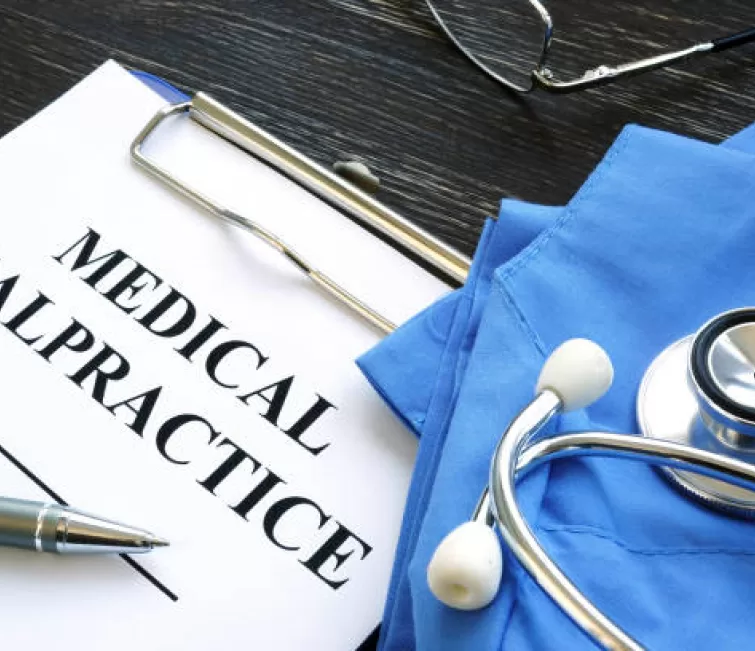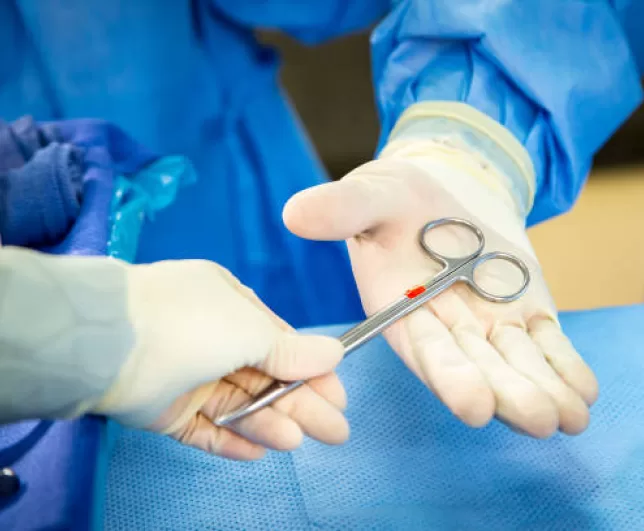Attorney:
Medical Malpractice
DO I HAVE A CASE?
CONTACT US NOW
FREE CONSULTATION
Imagine waking up in a hospital room, the sterile scent of antiseptics lingering in the air, the beep of medical equipment your only company. You were supposed to be better, healed even, but here you are feeling worse than ever. A simple routine surgery has left you in agony, the consequences of what you believe to be medical malpractice. It’s a horrific situation to find yourself in, an ordeal no one should have to go through.
At this point, you’re not just a victim of a medical mishap. You’re a warrior who has bravely endured. And every warrior deserves a steadfast ally – that’s where we, the Accident Medical Group, come in. Our team of experienced attorneys are relentless in their pursuit of justice. We’ll navigate the complex labyrinth of medical law, shoulder to shoulder with you, ensuring you receive the compensation you deserve. We’re not just your legal representatives – we’re your advocates, your champions, your partners in this journey towards justice.
What Floridians Should Know About Medical Malpractice
As a Floridian, it is crucial to understand the nuances of medical malpractice in your state. Medical malpractice is a legal term that refers to negligence committed by a healthcare provider, which results in patient injury. The Florida legal system has specific rules and regulations surrounding medical malpractice that are unique to the state. Let’s dive deeper into what every Floridian should know about medical malpractice, providing you with the knowledge to protect your rights and take informed actions should you ever find yourself in such an unfortunate situation.

Understanding the Statute of Limitations
In Florida, the statute of limitations for medical malpractice claims is typically two years. This means you have two years from when the malpractice occurred, or from when it should reasonably have been discovered, to file a lawsuit. Missing this deadline could result in the forfeiture of your right to pursue compensation.
The Requirement of a Medical Expert's Affidavit
Before you can proceed with a malpractice lawsuit in Florida, you’re required to obtain an affidavit from a medical expert confirming that your case is valid. This expert, usually a doctor, must state that they believe, to a reasonable degree of medical certainty, that the health care provider you’re suing fell below the acceptable standard of care, thus causing your injury.
Caps on Non-Economic Damages
It’s also crucial to understand that Florida has caps on non-economic damages in medical malpractice lawsuits. These are damages that don’t have a specific economic value, such as pain and suffering, loss of enjoyment of life, and mental anguish. However, in some instances, these caps have been found to be unconstitutional, so this is an ever-evolving area of the law.
Pre-Suit Investigation and Notice
Before filing a lawsuit, Florida law requires a 90-day “pre-suit investigation period.” During this time, your attorney will notify the defendant about your intent to sue, and both sides will investigate the claims being made. This can lead to early settlement discussions, but if an agreement can’t be reached, you are then free to file your lawsuit once the investigation period ends.
Medical Malpractice Laws to Be Aware Of
In the intricate world of medical malpractice law, there are many rules and regulations that you, as a potential plaintiff, need to be aware of. These laws can significantly impact the outcome of your case, and understanding them is key to successfully navigating the legal landscape. Here are some of the most crucial medical malpractice laws that every Floridian should be cognizant of:
The Burden of Proof
In any medical malpractice case, the burden of proof lies with the plaintiff, who must demonstrate that the healthcare provider was negligent and that this negligence directly resulted in injury. This generally requires the testimony of medical experts, who can attest to the deviation from standard care and the injuries caused as a result.
The Comparative Negligence Rule
Florida follows the rule of comparative negligence, which means that if a patient is found to be partly at fault for the injuries they sustained, their compensation will be reduced accordingly. For example, if a patient fails to follow post-operative care instructions and this exacerbates their condition, they may be held partially responsible.
The Vicarious Liability
Under the principle of vicarious liability, Florida law holds hospitals and medical practices responsible for the negligent actions of their employees. This means that if a nurse, technician, or any other healthcare worker commits malpractice, the hospital or medical practice can be sued along with the individual.
The Good Samaritan Law
The Good Samaritan Law in Florida protects healthcare professionals and ordinary citizens from liability if they offer assistance in an emergency situation outside of a hospital setting. This law is intended to encourage bystanders to aid those in need without fear of legal repercussions. However, this law does not apply if a healthcare provider’s misconduct occurs within the course of their employment.
The Florida Patient’s Bill of Rights and Responsibilities
If you find yourself a victim of medical malpractice, it can be an incredibly overwhelming and distressing time. It’s crucial to remember that you have rights and options available to you. Navigating through the legal process can be complex, but understanding the steps to take immediately after a medical malpractice incident can make a significant difference in your ability to secure the compensation you deserve. Let’s explore these steps in further detail to ensure you are prepared to act decisively should you ever find yourself in such an unfortunate circumstance.
Seek Immediate Medical Attention
First and foremost, if you believe you have been a victim of medical malpractice, it’s vital to seek immediate medical attention. This not only ensures your health and safety, but it also helps to document the extent of your injuries, which can be critical evidence in your case.
What Happens If I'm a Victim of Medical Malpractice?
If you find yourself a victim of medical malpractice, it can be an incredibly overwhelming and distressing time. It’s crucial to remember that you have rights and options available to you. Navigating through the legal process can be complex, but understanding the steps to take immediately after a medical malpractice incident can make a significant difference in your ability to secure the compensation you deserve. Let’s explore these steps in further detail to ensure you are prepared to act decisively should you ever find yourself in such an unfortunate circumstance.

Seek Immediate Medical Attention
First and foremost, if you believe you have been a victim of medical malpractice, it’s vital to seek immediate medical attention. This not only ensures your health and safety, but it also helps to document the extent of your injuries, which can be critical evidence in your case.
Contact a Medical Malpractice Attorney
Next, reach out to a medical malpractice attorney as soon as possible. They can guide you through the complexities of the legal process, help you understand your rights, and advise on the strength of your case. An attorney can also help gather necessary evidence, line up expert witnesses, and negotiate with the other party on your behalf.
Preserve Evidence
It’s important to preserve any evidence related to your case. This includes medical records, prescription information, receipts, and any other documents that can help establish your case. In some instances, you might want to take photographs of your injuries or the location where the malpractice occurred.
File a Medical Malpractice Claim
Finally, ensure to follow your attorney’s advice throughout the process. They are there to protect your interests and guide you towards the best possible outcome. By adhering to their counsel, you are more likely to secure the compensation you rightfully deserve.
Follow Your Attorney's Advice
Finally, ensure to follow your attorney’s advice throughout the process. They are there to protect your interests and guide you towards the best possible outcome. By adhering to their counsel, you are more likely to secure the compensation you rightfully deserve.
I Am Being Accused of Medical Negligence. Now What?
Finding yourself in a situation where you, as a healthcare provider, may have committed medical malpractice can be a complicated and distressing period. It’s crucial to navigate the situation carefully to protect both your professional standing and your legal rights. Here are some steps to consider if you think you may be involved in a medical malpractice incident:

Identify the Issue
The first thing to do is identify the issue at hand. Are you facing a medical malpractice lawsuit? Has a complaint been raised about a specific incident? Understanding the exact issue will help you gauge the severity of the situation and determine the best course of action moving forward.
Cooperate with Your Defense
It’s imperative that you cooperate fully with your defense team. Be honest about the situation, provide all necessary information, and follow their advice to optimize your defense strategy.
Consult a Legal Professional
Before taking any other steps, it is advisable to consult with a legal professional experienced in medical malpractice cases. They can provide valuable advice and guidance on the best next steps to protect your rights and handle the situation appropriately
Seek Peer Support
Facing allegations of medical malpractice can be stressful and isolating. Reach out to your peers or professional organizations
for support, guidance, and resources.
Gather Evidence
Just as a plaintiff in a medical malpractice case needs to gather evidence, so should a defendant. This includes any relevant medical records, documentation, notes, or other supporting materials that could prove beneficial in defending your case.
Learn from the Experience
Regardless of the outcome, it’s important to learn from this experience. Take note of any systemic or personal failures, and make the necessary changes to avoid any similar incidents in the future.
Steps to Take After a Medical Malpractice Incident
As daunting as it may be, enduring a medical malpractice incident is not the end of the road. In fact, understanding the appropriate steps to take after such an incident can empower you in this difficult situation, potentially leading to the restitution you deserve. Here, we will outline the key steps to undertake following a medical malpractice event. By familiarizing yourself with these actions, you can make informed decisions that further your best interests.

Understand Your Rights
As a victim of medical malpractice, you should familiarize yourself with your legal rights. You may be entitled to compensation for medical bills, loss of wages, pain and suffering, and other damages related to the malpractice.
Document Everything
Maintain a chronicle of all events, symptoms, and changes in your health since the incident. Documented analytics could serve as crucial evidence when proving the extent of malpractice.
File a Complaint
Report the incident to the relevant healthcare facility or professional board. Submitting a formal complaint helps prompt an internal investigation and possibly prevent similar incidents from occurring in the future.
Stay Committed
The process of pursuing a medical malpractice lawsuit can be time-consuming and emotionally draining. It’s crucial to remain steadfast in your pursuit of justice, even when faced with challenges or delays.
Prepare for Possible Outcomes
Not all medical malpractice cases result in a favorable outcome for the plaintiff. It’s important to be prepared for all possible outcomes, including dismissal, settlement, or trial. Discuss potential scenarios with your attorney to develop a comprehensive understanding of what to expect.

Recovering Compensation as a Victim of Medical Malpractice
The aftermath of a medical malpractice incident is not only emotionally distressing but also financially daunting. In such instances, recovering compensation for the harm done becomes a significant part of the healing process. This compensation is not about retribution, but rather about securing resources needed for recuperation and moving forward. In the following sections, we’ll explore the different factors involved in recovering compensation after a medical malpractice incident and how you can maximize your chances of a fair settlement.
Consult with a Medical Malpractice Attorney
After experiencing a medical malpractice incident, one of the very first steps toward recovering compensation is to consult with a specialized attorney. They can assess your case, explain your rights, and guide you through the complex legal processes that lie ahead. Remember, it’s beneficial to choose an attorney with a proven track record in similar cases.
Determine the Value of Your Claim
Determining the value of your claim is a critical step in the compensation recovery process. This encompasses not only your current medical expenses but also future costs, loss of earnings, and non-monetary damages like pain and suffering. A skilled attorney can help you accurately calculate these damages.
File a Legal Claim
Once you have a clear understanding of your case’s value, your attorney will file a legal claim against the responsible parties. This claim should detail the allegations, evidence of negligence, and the damages you’re seeking.
Negotiate a Settlement
Many medical malpractice cases are resolved through settlements rather than court trials. If a settlement is offered, your attorney will negotiate with the defendant’s legal team to secure the best possible outcome for you. It’s essential to remember that you should never agree to a settlement without first consulting your attorney.
Managing Your Finances
While you’re recovering from your injury, it’s essential to manage your finances carefully. Workers’ compensation benefits may not cover all of your lost wages, and you could face additional expenses related to your injury. Planning a budget, cutting back on unnecessary spending, and exploring other financial assistance options can help you stay afloat during this challenging time.
Proceed to Trial if Necessary
If a satisfactory settlement cannot be reached, your case may proceed to trial. During the trial, both sides will present their case, and a judge or jury will make a decision. This step requires extensive preparation, and your attorney will guide you through the process.
Receive Your Compensation
Once a settlement is reached or a verdict is given in your favor, the final step is to receive your compensation. This process may take some time, especially in complex cases, but ultimately serves to provide you with the resources necessary for your recovery journey.
Dealing with Insurance After Medical Negligence
Navigating through the insurance proceedings following medical negligence can seem like a daunting task. However, understanding how to interact with insurance companies can significantly streamline your path to just compensation. The following steps empower you to effectively deal with insurance after such an unfortunate event, ensuring you have the necessary knowledge and strategy to articulate your situation effectively. These steps can guide you through the intricate maze of insurance claims, helping you secure the best possible outcome.

Understand Your Insurance Coverage
First and foremost, you should gain a thorough understanding of your insurance coverage. Be sure to review your policy carefully, paying close attention to the specifics of medical malpractice claims. Understanding the particulars of your policy will help you to know what you can claim for and how to go about the process.
Notify Your Insurance Provider
As soon as you’re able, notify your insurance provider of the incident. In many cases, there is a time limit within which you must report a claim, so it is crucial not to delay this step. Be prepared to provide all the necessary details about the malpractice incident.
Gather All Necessary Documentation
Collect all relevant documents related to your case, such as medical records, receipts for medical expenses, and any correspondence related to the incident. This documentation will be key to substantiating your claim.
Submit Your Claim
Once you have all necessary documentation in order, submit your claim to your insurance provider. It’s important to be as detailed and accurate as possible when reporting the incident and the damages you’ve suffered.
Communicate Through Your Attorney
Insurance companies are often looking to limit the amount they pay out for claims. Therefore, it may be in your best interest to communicate with the insurance company through your attorney. They can guide you on what to say and what not to say to avoid jeopardizing your claim.

Medical Malpractice Can Have Financial Consequences
Medical malpractice incidents often extend beyond the physical and psychological impacts, spilling over into the economic sphere of victims’ lives. The ensuing financial consequences can be onerous, adding undue stress to an already challenging situation. In the subsequent sections, we’ll delve deeper into the potential financial implications of medical malpractice, illuminating the often overlooked economic aftermath of these unfortunate events.
Unanticipated Medical Expenses
Post a malpractice incident, victims often find themselves saddled with unexpected and steep medical expenses. These may include the cost of long-term treatments, rehabilitation, medications, and possible future surgeries. The financial strain caused by these extra expenditures can be considerable, adding to the distress of the victims and their families.
Loss of Income
Often, victims of medical malpractice are unable to return to work immediately, resulting in lost wages. In severe cases, victims might be rendered permanently disabled, leaving them unable to work in their chosen profession. The resulting loss of income can significantly impact the victim’s financial stability, exacerbating the economic consequences of the incident.
Increased Insurance Premiums
A less obvious financial impact of medical malpractice is the potential increase in insurance premiums. After making a claim, insurance providers might increase the premiums, making it more expensive for the victim to maintain their insurance coverage.
Legal Costs
Claiming compensation for medical malpractice usually involves a legal process, which brings with it additional costs. These might include attorney fees, costs for expert witnesses, court fees, and other litigation expenses. While some of these costs might be recovered as part of the settlement, not all expenses are recoverable, potentially leaving the victim with significant legal debts.
Impact on Mental Health
The long-term financial consequences of a medical malpractice incident can be quite severe, especially in cases of permanent disability. Victims might need to significantly alter their financial plans, affecting their retirement savings, children’s education funds, and overall financial security. The cost of future care, including assisted living or home modifications, should also be considered.
Remember, it’s important to seek legal advice promptly to understand your rights and the potential financial implications of your case. A qualified attorney can guide you through the process, helping to secure the best possible outcome for your situation.
How Can a Lawyer Who Specializes in Medical Malpractice Help Me?
A medical malpractice lawyer can be an invaluable ally in navigating the complex terrain of malpractice claims. These professionals have a deep understanding of the legal landscape and can provide critical support in pursuing your case. Here’s how they can help:

Expert Legal Guidance
Navigating the complex world of medical malpractice laws can be challenging for individuals without legal expertise. A medical malpractice lawyer can offer expert guidance, helping you to understand your rights and the legal process.
Case Preparation
Building a solid case requires thorough preparation, including gathering evidence, identifying expert witnesses, and formulating legal arguments. Your attorney can take care of these tasks, ensuring that your case is as strong as possible.
Negotiation and Litigation
Your lawyer can negotiate with insurance companies on your behalf, striving to secure a fair settlement. If your case goes to trial, they will represent you in court, fighting for your rights and interests.
No Upfront Costs
Most medical malpractice lawyers work on a contingency basis, meaning they only get paid if you win your case. This can ease the financial burden of pursuing legal action.
In the subsequent sections, we’ll delve deeper into each of these points, highlighting the essential role of a medical malpractice lawyer in your pursuit of justice.
Ongoing Support and Communication
Our compassionate team at AMG understands the emotional toll of medical malpractice incidents. We offer ongoing support and keep you informed at each stage of the process, ensuring you never feel alone or overwhelmed by the legal proceedings. Our goal is to make the process as smooth and stress-free as possible for you and your loved ones.

Contact (305)-264-4357 About Medical Malpractice
Don’t let a medical malpractice incident leave you burdened with financial stress and unanswered questions. Reach out to 305-AMG-HELP for a free consultation. Our team of dedicated, experienced lawyers is ready to help you navigate the complex legal landscape and fight for the compensation you deserve. You’ve suffered enough – it’s time to let us carry the burden. Contact us today and take the first step towards securing justice.
